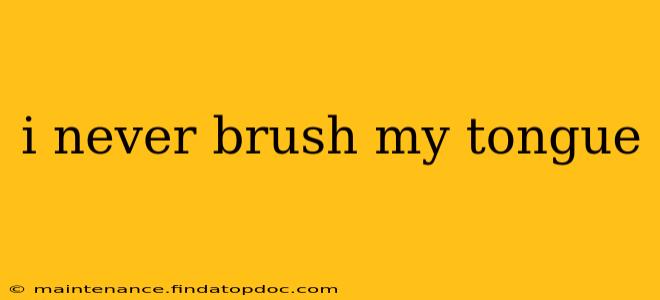Many people overlook a crucial step in their oral hygiene routine: brushing their tongue. While brushing your teeth is ingrained in most of us, neglecting your tongue can have significant consequences for your oral health and overall well-being. This comprehensive guide will explain why brushing your tongue is essential and provide a step-by-step guide to doing it correctly.
Why Should I Brush My Tongue?
The surface of your tongue is a breeding ground for bacteria, food particles, and dead cells. These contribute to bad breath (halitosis), a common concern for many. Beyond the cosmetic issue of bad breath, neglecting your tongue can lead to more serious problems.
- Bad Breath: The most immediate and noticeable consequence. Bacteria break down food particles, producing volatile sulfur compounds (VSCs) that cause foul odors.
- Gum Disease: Bacteria from the tongue can easily spread to the gums, contributing to gingivitis and periodontitis. These infections can lead to gum inflammation, bleeding, and even tooth loss.
- Increased Risk of Cavities: Bacteria on the tongue contribute to the overall bacterial load in your mouth, increasing the risk of cavities and dental decay.
- Oral Infections: Poor tongue hygiene can increase the risk of oral thrush (a fungal infection) and other infections.
What Happens if I Don't Brush My Tongue?
Failing to brush your tongue allows bacteria to accumulate, leading to a vicious cycle of bad breath and potential oral health problems. The longer you neglect this crucial step, the more severe the consequences could become. You might experience persistent bad breath despite brushing your teeth, notice increased gum inflammation, or even develop more serious oral infections.
How Often Should I Brush My Tongue?
For optimal oral hygiene, aim to brush your tongue at least once a day, ideally as part of your regular morning and evening brushing routine.
How Do I Brush My Tongue Properly?
Brushing your tongue isn't just about scrubbing vigorously; it's about a gentle, effective technique. Here's how to do it:
- Use a Soft-Bristled Brush: A toothbrush with soft bristles is crucial to avoid irritating your tongue's sensitive surface.
- Extend Your Tongue: Gently extend your tongue as far as you comfortably can.
- Brush From Back to Front: Starting at the back of your tongue, gently brush forward in short strokes. Avoid scrubbing too hard, as this can cause irritation or nausea.
- Rinse Thoroughly: After brushing, rinse your mouth thoroughly with water or mouthwash to remove any loosened debris.
- Don't Forget the Sides: Don't just focus on the top surface of your tongue; gently brush the sides as well.
What if I Don't Have a Tongue Scraper? Can I Just Use My Toothbrush?
While a tongue scraper is ideal for thorough cleaning, you can effectively clean your tongue with your toothbrush. Just ensure you're using gentle strokes and rinsing thoroughly afterward. However, a tongue scraper is generally more effective at removing bacteria and debris.
Is it Normal to Have a White Coating on My Tongue?
A thin white coating on your tongue is sometimes normal, but a thick or persistent coating can indicate a problem. This could be due to dehydration, poor oral hygiene, or underlying medical conditions. If you notice a persistent white coating, consult your dentist or doctor.
Does Brushing My Tongue Help With Bad Breath?
Yes! Brushing your tongue is one of the most effective ways to combat bad breath. By removing bacteria and food particles from the tongue's surface, you significantly reduce the production of odor-causing compounds.
Can I Use Mouthwash Instead of Brushing My Tongue?
Mouthwash can help freshen breath, but it's not a substitute for brushing your tongue. Mouthwash primarily targets bad breath, whereas brushing removes the bacteria and debris that cause it. For optimal oral hygiene, both brushing and rinsing are recommended.
By incorporating tongue brushing into your daily routine, you significantly improve your oral health, reducing your risk of bad breath, gum disease, and other oral health problems. Make it a habit—your mouth will thank you!
